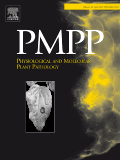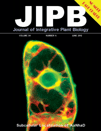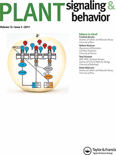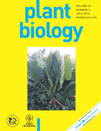
PHYSIOLOGICAL AND MOLECULAR PLANT PATHOLOGY
Scope & Guideline
Advancing the frontiers of plant disease research.
Introduction
Aims and Scopes
- Plant-Pathogen Interactions:
Explores the physiological and molecular responses of plants to biotic stress, including the mechanisms of resistance and susceptibility to various pathogens. - Molecular Mechanisms of Disease Resistance:
Investigates the genetic and biochemical pathways involved in plant immune responses, including the role of signaling molecules, transcription factors, and metabolic pathways. - Biocontrol and Sustainable Management Strategies:
Focuses on the development and application of biological control agents, including beneficial microbes and natural compounds, for sustainable disease management in agriculture. - Pathogen Characterization and Genomics:
Involves the study of pathogen diversity, virulence factors, and genomic characterization to understand the evolutionary relationships and pathogenicity of plant pathogens. - Environmental Stress and Plant Health:
Examines the effects of abiotic stresses (e.g., drought, salinity) on plant health and their interactions with pathogen infections, contributing to our understanding of plant resilience.
Trending and Emerging
- CRISPR and Genome Editing Applications:
The use of CRISPR technology for developing disease-resistant crop varieties is gaining momentum, reflecting a trend towards genetic engineering as a tool for improving plant resilience. - Omics Approaches in Plant Pathology:
The integration of genomics, transcriptomics, proteomics, and metabolomics is increasingly prevalent, providing comprehensive insights into plant-pathogen interactions and disease mechanisms. - Microbiome and Plant Health:
Research on the role of plant microbiomes in enhancing disease resistance and overall plant health is emerging as a significant theme, with studies focusing on beneficial microbes and their interactions. - Natural Compounds and Biopesticides:
There is a growing interest in the exploration of natural plant extracts, secondary metabolites, and biopesticides as sustainable alternatives for disease management in agriculture. - Interdisciplinary Approaches:
Collaborations across fields such as molecular biology, ecology, and agricultural science are becoming more common, indicating a trend towards holistic understanding of plant health and disease dynamics.
Declining or Waning
- Traditional Chemical Control Methods:
Research on synthetic fungicides and conventional chemical treatments for plant disease control has decreased, as there is a growing emphasis on biological and integrated pest management strategies. - Morphological Characterization of Pathogens:
The focus on purely morphological studies of pathogens is waning, as molecular and genomic techniques provide more robust and detailed insights into pathogen biology. - Basic Plant Physiology Studies:
There is a noticeable decrease in studies solely dedicated to basic physiological responses of plants to pathogens, with a stronger focus now on molecular and genetic aspects of plant-pathogen interactions. - Single Pathogen Studies:
Research concentrating on single pathogen-host interactions is declining in favor of more complex studies that consider multi-pathogen systems and the impact of the microbiome on plant health.
Similar Journals

EUROPEAN JOURNAL OF PLANT PATHOLOGY
Cultivating knowledge for a healthier future in horticulture.The EUROPEAN JOURNAL OF PLANT PATHOLOGY, published by SPRINGER, is a leading academic journal dedicated to advancing the understanding of plant pathology within the fields of Agronomy, Horticulture, and Plant Science. With an ISSN of 0929-1873 and an E-ISSN of 1573-8469, this journal has established its presence since its inception in 1994 and continues to serve as an essential resource for researchers, professionals, and students through 2024. The journal is ranked in the Q2 category in multiple scholarly domains and boasts impressive Scopus rankings, placing it in the 80th percentile for Horticulture and 69th percentile for Plant Science. Notably, it facilitates the dissemination of cutting-edge research and reviews that address critical challenges in plant health, disease management, and sustainable agricultural practices. Although the journal is not Open Access, it provides vital insights and contributes significantly to the scientific community, fostering collaboration and innovation in plant pathology.

Journal of Integrative Plant Biology
Innovative Research, Global ImpactThe Journal of Integrative Plant Biology, published by WILEY, is a premier academic journal that has been at the forefront of advancing research in plant biology since its inception in 2005. With a notable impact factor and a robust Scopus ranking—positioned at #7 out of 516 in Plant Science and #18 out of 438 in Biochemistry—this journal is recognized as a Q1 journal in multiple categories, including Biochemistry and Plant Science. The journal aims to bridge the gaps between various disciplines in plant research, emphasizing integrative and interdisciplinary approaches to understanding plant biology. With options for open access, the Journal of Integrative Plant Biology ensures broad visibility and impact of research findings, making it an invaluable resource for researchers, professionals, and students looking to stay informed on innovative advancements in the field. Its headquarters are located in the United Kingdom, further amplifying its reach within the global academic community.

Molecular Horticulture
Exploring the Intersection of Science and SustainabilityMolecular Horticulture is a prestigious journal published by SpringerNature, dedicated to advancing knowledge in the fields of Agronomy, Crop Science, Horticulture, and Molecular Biology. Based in the United Kingdom, this journal, with ISSN 2730-9401, is recognized for its high-quality, peer-reviewed research and has rapidly established itself within the academic community, achieving a remarkable Q1 ranking across its relevant categories as of 2023. With a strong focus on innovative research that explores the intersection of molecular biology and horticultural science, Molecular Horticulture provides valuable insights that are essential for researchers and professionals aiming to enhance crop production and sustainability practices. As part of the Scopus database, the journal ranks impressively within its fields, holding notable positions such as Rank #7 in Horticulture and Rank #42 in Agronomy and Crop Science. While currently published through traditional access models, the journal remains accessible to a wide audience of scientists, educators, and students eager to stay informed on the latest discoveries and trends in plant science.

Plant Signaling & Behavior
Advancing Knowledge in Plant Responses and SignalingPlant Signaling & Behavior is a prestigious journal published by TAYLOR & FRANCIS INC, dedicated to advancing the understanding of the complex signaling mechanisms and behavioral responses of plants. With an ISSN of 1559-2316 and an E-ISSN of 1559-2324, it has firmly established itself in the field of Plant Science, earning a Q1 ranking in the 2023 category quartiles and ranking #83 out of 516 in Agricultural and Biological Sciences, placing it in the 84th percentile according to Scopus metrics. The journal serves as a vital platform for researchers and professionals looking to publish innovative studies and reviews that explore the intricate relationships between plant behavior and environmental signaling. With coverage spanning from 2006 to 2024, Plant Signaling & Behavior not only enhances academic discourse but also supports the growing interdisciplinary nature of plant sciences. Although the journal is not open access, it remains a significant resource for students, researchers, and practitioners aiming to deepen their understanding of plant signaling and its implications for ecology and agricultural practices.

PLANT BIOLOGY
Unveiling the Secrets of Plant EcologyPLANT BIOLOGY is a prestigious academic journal published by Wiley, dedicated to advancing knowledge in the fields of plant science, ecology, and evolutionary biology. With an impressive impact factor and ranking in the Q1 category for Ecology, Evolution, Behavior and Systematics, and Plant Science as of 2023, it stands at the forefront of research dissemination. The journal encompasses a broad scope of plant biology topics, providing a critical platform for researchers to share innovative findings and foster interdisciplinary collaboration. Available in both print (ISSN: 1435-8603) and online formats (E-ISSN: 1438-8677), it ensures accessibility through open access options. As a crucial resource for professionals, researchers, and students alike, PLANT BIOLOGY cultivates a deeper understanding of plant systems and their ecological significance, making it an essential addition to the library of anyone dedicated to the study of biology and the environment.

JOURNAL OF GENERAL PLANT PATHOLOGY
Unveiling Insights into Plant Pathology and Crop HealthJOURNAL OF GENERAL PLANT PATHOLOGY, published by SPRINGER JAPAN KK, is a pivotal platform dedicated to the dissemination of high-quality research in the fields of agronomy and crop science, as well as plant pathology. With an ISSN of 1345-2630 and an E-ISSN of 1610-739X, this journal plays a significant role in advancing our understanding of plant diseases and their management, particularly within the context of sustainable agriculture. Currently ranking in the Q3 quartile for both Agronomy and Crop Science as well as Plant Science, it showcases a diverse array of articles that encompass fundamental research, innovative methodologies, and practical applications to address contemporary challenges in these fields. Researchers and professionals seeking to enhance their knowledge and stay abreast of the latest findings will find the JOURNAL OF GENERAL PLANT PATHOLOGY an invaluable resource. Operating without Open Access, it still ensures wide accessibility through institutional subscriptions and comprehensive digital archiving, with a commitment to excellence from its inception in 2001 through its ongoing developments into 2024.

JOURNAL OF PLANT PATHOLOGY
Illuminating the Pathways of Plant HealthJOURNAL OF PLANT PATHOLOGY, published by SPRINGER, is a premier academic journal dedicated to advancing the understanding of phytopathology and related fields. With a strong international presence and an impact factor that reflects its influence in the scientific community, this journal offers essential insights to researchers, professionals, and students engaged in plant health. Since its inception in 1997, it has consistently provided a platform for innovative research, contributing to the Q2 rank in Plant Science as per the 2023 category quartiles. The journal covers a broad spectrum of topics related to plant diseases, their management, and the ecological impacts they pose, ensuring relevance to contemporary challenges in agriculture and sustainability. While the journal does not currently offer Open Access options, it remains a crucial resource for those looking to deepen their knowledge and bolster their research endeavors in the vital area of plant pathology.

Gesunde Pflanzen
Pioneering Insights into Plant PathologyGesunde Pflanzen is a prestigious peer-reviewed journal published by Springer, based in Germany. Specializing in the fields of agricultural and biological sciences, this journal has established itself as an essential resource for researchers, professionals, and students interested in plant health and pathology. With an impressive impact factor in the Q2 category, ranking 73 out of 221 within the general agricultural and biological sciences field (67th percentile as of 2023), Gesunde Pflanzen offers invaluable insights into current trends, challenges, and breakthroughs in plant research. The journal has been consistently publishing academic contributions since its inception in 1974, fostering advancements in agricultural practices and promoting sustainable plant health management strategies. While the journal does not currently offer open access options, its rigorous peer-review process ensures that published articles maintain high standards of scientific integrity and relevance. Researchers and professionals in the field are encouraged to engage with this journal to stay abreast of the latest findings and methodologies shaping the future of agriculture.

Czech Journal of Genetics and Plant Breeding
Advancing genetic innovation for a sustainable future.Czech Journal of Genetics and Plant Breeding is a premier academic journal dedicated to advancing the fields of genetics and plant science. Published by the esteemed Czech Academy Agricultural Sciences, this journal has been available as an Open Access resource since 2002, ensuring that essential research is freely accessible to a global audience. With an ISSN of 1212-1975 and an E-ISSN of 1805-9325, it continues to disseminate high-quality studies and findings from the vibrant scientific community in the Czech Republic and beyond. The journal operates within the Scopus ranks, securing 279th place in the category of Plant Science and 282nd in Genetics, reflecting its commitment to scholarly rigor. The Journal's objectives focus on exploring innovations in genetic research and plant breeding methodologies, offering valuable insights that foster collaboration among researchers, professionals, and students alike. As the journal converges from 2007 to 2024, it remains a vital publication for those seeking to stay abreast of developments in genetic diversity, crop improvement, and sustainable agriculture practices.

Plant Stress
Fostering Collaboration in Plant Stress ResearchPlant Stress is a prestigious academic journal published by Elsevier that focuses on the critical study of stress responses in plants, bridging vital areas such as ecology, evolution, and plant science. With its ISSN 2667-064X, this journal serves as an essential platform for researchers and professionals seeking to explore innovative findings and advancements in plant stress biology. Its notable rankings in the Q1 category for both Ecology, Evolution, Behavior, and Systematics and Plant Science as of 2023 further establish its significance, being recognized in the top quartile of its field. The journal’s impressive Scopus ranks, including Rank #144/721 and Rank #107/516 in the respective categories, highlight its influence and the quality of research it disseminates. While currently not offering Open Access, Plant Stress is instrumental in fostering academic dialogue and collaboration among researchers worldwide, with implications that extend beyond theoretical studies into practical applications in agriculture and environmental management. For those dedicated to understanding plant resilience and stress adaptation, Plant Stress is an indispensable resource.